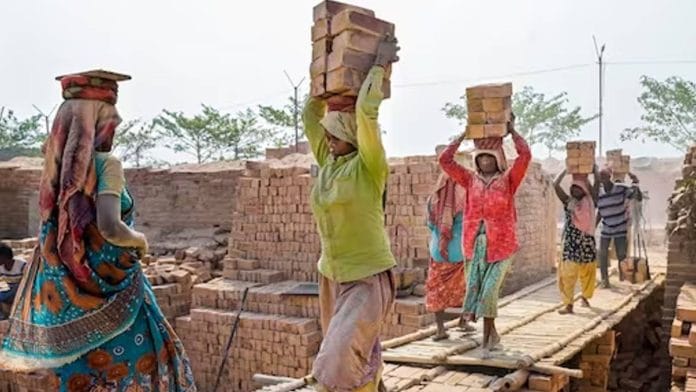New Delhi: Pointing out the low wages paid to workers under the Mahatma Gandhi National Rural Employment Guarantee Scheme (MGNREGS), a parliamentary panel recommended Tuesday that the Centre increase them and link them to an inflation index.
The Parliamentary Standing Committee on Rural Development and Panchayati Raj observed that the amount paid to workers is “inadequate and not in consonance with the rising cost of living”. The observation was part of the action taken report tabled in Parliament Tuesday on the committee’s recommendations on the Centre’s MGNGRES.
The wage rate, as notified by the Centre earlier this year, varies between Rs 234 and Rs 374 per day. Haryana and three Gram Panchayats of Sikkim have the highest wage rate — Rs 374 per day. At Rs 234, the lowest is in Arunachal Pradesh, followed by Uttar Pradesh and Uttarakhand — Rs 237 per day.
The committee, headed by Congress MP Saptagiri Sankar Ulaka, said the “abysmally low” amount is one of the main reasons for the workers to “opt out of MGNREGA”.
Urging the rural development ministry to increase the wages, the committee said, “Taking up works under MGNREGA is a sort of last resort for many of the poor rural masses who do not have any other option of livelihood or job option to utilise but wages of such nominal nature some time with delayed payment only discourage them and propel them to migrate and seek work in areas giving better remuneration.”
The committee also questioned the method adopted by the ministry to fix the wages.
The Centre notifies the wage rate under MGNREGA using the Consumer Price Index for Agricultural Labour (CPI-AL), with the wage rates thus obtained on 1 April 2009 or Rs 100 — whichever is more — as the base for indexation for the states, according to the report.
The committee has recommended the ministry explore the feasibility of revising the base year and base rate to “bring relief to the poor rural masses” who rely on the scheme for their livelihoods.
In its report ‘Rural Employment through Mahatma Gandhi National Rural Employment Guarantee Act (MGNREGA) – An insight into wage rates and other matters relating thereto (2023-24)’, tabled in the Parliament in February 2024, the committee recommended the ministry select a “more suitable index for neutralising the inflationary effect” at the time of revision of wage rates 10 under MGNREGA.
In its recent report, the committee reiterated its recommendation.
‘Aadhaar-based payment shouldn’t be mandatory’
The committee has recommended the ministry not make the Aadhaar-Based Payment System (ABPS) mandatory to settle wages, nearly a year after the government made the ABPS mandatory despite protests by workers and civil society members.
Of the 13.02 crore active workers, the government claims to have completed the Aadhaar seeding of 98.85% of workers. While the committee accepted that APBS would help to pay wages to genuine workers, it said that “it is too early to make it mandatory” as problems related to Aadhaar remain unresolved.
“The Committee reiterates their earlier recommendation that APBS should not be made mandatory and alternative mechanisms should always operate side by side to ensure that the primary goal of MGNREGA to provide wages does not get defeated due to lack of proper implementation of technology,” the report said.
(Edited by Madhurita Goswami)
Also Read: MGNREGS needs an overhaul. Sharing fiscal burden with states is not enough






